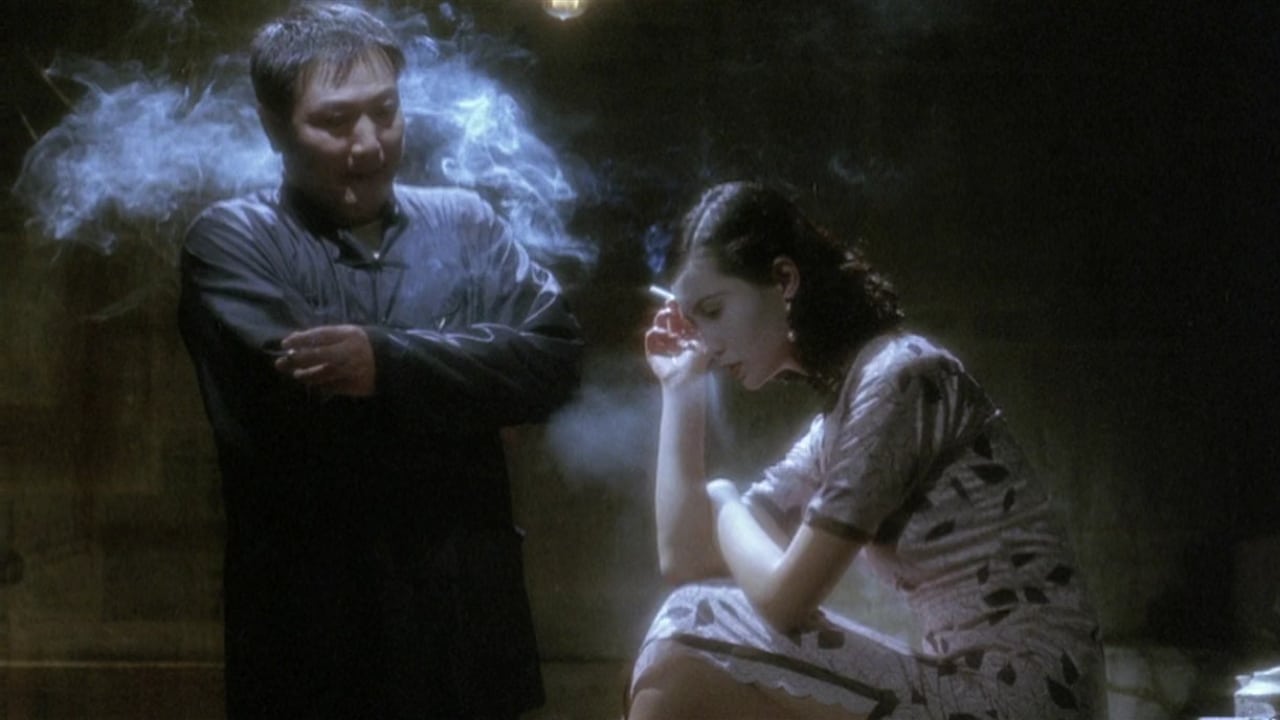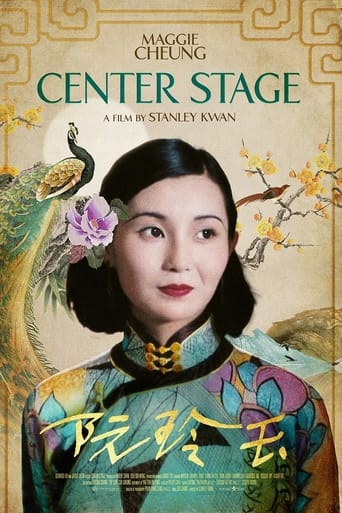RyothChatty
ridiculous rating
Limerculer
A waste of 90 minutes of my life
Billie Morin
This movie feels like it was made purely to piss off people who want good shows
Celia
A great movie, one of the best of this year. There was a bit of confusion at one point in the plot, but nothing serious.
Ron Chow
I stumbled on a DVD copy of the film from the local library, but before that I never heard of this film. Stanley Kwan also directed Rouge, a film I enjoyed and liked very much, and that prompted my decision to make the time investment to watch it.Center Stage, aka Yuen Ling-Yuk (Cantonese pronunciation of the main character) or Ruan Ling-Yu (the mandarin equivalent) is a slow film, a period piece focused on the life and premature death of an actress in the 30's in China. As a kid growing up in Asia several decades ago I never watched B/W silent films, so Yuen was never known to me, until now.It was a slow film, but well acted and researched. I enjoyed the depiction of Shanghai in the 30's and the personification of various people in the entertainment circle. This film is obviously not for everyone. For the selected few with the interest or the cultural background, it is a film worth watching. If nothing else, it is a cultural lesson on the filming business and a snapshot of the Chinese society in 1930. Seeing some big name actors in it, doing what they do best, is a bonus.
chadstep
I'm a novice at Chinese history, especially in the area of periods of film, and, being American, I'm particularly fascinated by it and comparing it to period pieces set in the 1930's US (a la "Cat's Meow" or "Miller's Crossing"). I was particularly taken with Centre Stage's attention to detail in period dress, music, and movie deal-making among the industry. As opposed to American movies focusing of stars/starlets' merciless climb to the top of the industry, Maggie Cheung plays Ruan as a kind, clever, and talented actress whose versatility and assertiveness helps her move beyond pigeonholing by the industry to play a wide range of parts--revolutionary, new woman, peasant-girl.One part it seems which has been overlooked in the few reviews I've read is how this image of feminism illustrates China's version of liberation. Cheung plays Ruan as both a feminist in charge of her career, as well as a woman who is in control of her scandalous affair with Lawrence Ng's character. The difference between her and him being that men are understood to have concubines and are forgiven for the indecency, while Maggie's career is ruined (though she never apologizes for it in any way). Traditional roles still trump profession in 1930's China, but the sadness of it all being retold shows a strong Ruan overcoming every possible trap--losing a career over an affair, especially--and maintaining her desires for success.For Cheung's performance, it never wavered. I was a big fan of hers in "Irma Vep" and she was just a strong in this role playing Ruan. Effortless shifts between emotion ("So, you're showing me your true face," her lover says as she blows smoke in his face obstinately, then switches to a kindly-wife smile--is she practicing her role in the movie, or is that really her?), graceful poise courtesy of the era before slouching was cool, private display of emotion, and elegant role-play as mistress and ex-wife with Tony Leung.I'd have to know more about the history of Ruan to know if this is an accurate portrayal of her life, but the film-making style of inter-cutting Cheung playing her in the 30's while interviews with Ruan's colleagues from that time as they are interviewed by the director of the movie is a fascinating way to present her history. Is it a bio-pic? Is it a historical fiction? Is it a retrospective? It's all and more.
Andy (film-critic)
This film took me two weeks to watch. I had begun this film , but found myself so bored with the story that it couldn't keep my interest. In fact, last night when I finally finished the film, I had to keep myself awake by pulling at my hairs on my head to keep me from dozing during this documentary.I call it a documentary, but it is actually a representation of her life as an actress played by modern actresses. It is similar to the film JFK with several actors playing the part of actual people with clips of the event sewn throughout the film. This was quite possibly the dullest film ever made. I am surprised that it won any awards, much less sweeping the Hong Kong Film Festival. The characters were one-dimensional. They had no spirit, no soul, no care only to walk around in period piece costumes. Everyone in this movie is exceedingly composed - they speak carefully, and walk perpetually as if on eggshells. No one really comes alive until a scene at a dance hall near the end. But despite all the sugary politeness, Cheung successfully conveys a woman who is being slowly destroyed by her oppressive environment. There are a couple scenes in which she completely loses it, and it's very affecting to watch, but not worth two hours of my time. I had trouble understanding this film. There was a rumor that when it was released at the film festival in 1992, it was accidentally shown out of order, yet it still won the praise of critics. That doesn't make any sense to me. How can a film be out of sequence, yet still being considered the best out there? There was times that I felt I was watching a PBS special, but a very poorly done special.If a person from the streets were to come up to me and ask me what my favorite part of this film to me would be, I would have no answer. I did not like one portion of this film. The characters were dull, the story was tough to follow, and the pacing was completely off. Nothing made sense in this film. No acting actually occurred in this film. This was one of my first experiences with Hong Kong cinema, and I think I perhaps started on the wrong foot. I am looking forward to my next film from Hong Kong, because it can only be better than this. Even if it only showed growing grass for an hour and a half, it would be better. Perhaps I am being too negative about this film, but I just couldn't get into it. Sorry Hong Kong! Grade: * out of *****
donleavy
A biopic of Chinese silent film actress from the 30's, Ruan Lingyu, with Maggie Cheung as Ruan. This movie tells the sad story of a young woman who is rescued from poverty by show business, and is subsequently destroyed by it. It's a classic story of the patriarchal double standard in which an adulterous woman is punished by society while an adulterous man is not.Maggie Cheung's performance is quite good. First of all, she pulls off being an actress playing an actress who is very immersed in her work.Everyone in this movie is exceedingly composed - they speak carefully, and walk perpetually as if on eggshells. No one really comes alive until a scene at a dance hall near the end. But despite all the sugary politeness, Cheung successfully conveys a woman who is being slowly destroyed by her oppressive environment. And there are a couple scenes in which she completely loses it, and it's very affecting to watch.The movie is very interestingly interspersed with clips from Ruan's movies, documentary footage of Ruan's surviving contemporaries, and the actors' conversations with the director.The other actors, such as Tony Leung Ka Fai, Carina Lau, and Waise Lee, who are so interesting in other movies, all have little to nothing to do, except to look nice in period costume.Also interesting is the fact that Carina Lau (who plays fellow actress Lily Li) looks much more like the real Ruan Lingyu than Maggie Cheung does.Watching this film is a bit like watching a PBS documentary - edifying, educational, but not exactly fun.

